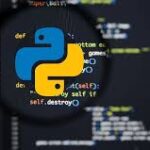Python is one of the most popular languages for web development, known for its simplicity, readability, and extensive support through frameworks and libraries. Whether you’re building a small-scale web application or a large enterprise solution, Python’s ecosystem for web development offers powerful tools to make the development process efficient and enjoyable.
The most commonly used web development framework in Python is Django. Django is a high-level web framework that enables rapid development of secure and maintainable websites. With Django, developers don’t have to worry about many of the common web development tasks, as it provides built-in solutions for URL routing, authentication, database management, and more. Its “batteries-included” philosophy means that many tools come ready-to-use, saving developers time and effort.
Another popular Python web framework is Flask, which is lightweight and simple to use, making it a favorite among developers who want more control over the components of their web applications. Flask is great for smaller applications or projects where you need flexibility in choosing third-party libraries. It doesn’t come with the built-in tools like Django, which makes it more customizable but also requires more development effort to set up certain features.
For creating APIs, FastAPI is gaining popularity due to its speed and ease of use. FastAPI is designed for building APIs with Python, and it’s optimized for performance. It integrates easily with Python’s asynchronous capabilities, making it an excellent choice for projects that require fast, efficient, and scalable web services.
Jinja2, a templating engine, is another essential tool in Python web development. Jinja2 is often used with Flask and Django for rendering dynamic HTML pages. It allows developers to embed Python-like expressions in HTML, making it easier to integrate dynamic content into web applications.
For database interaction, Python web frameworks often use SQLAlchemy, a powerful Object Relational Mapper (ORM) for managing database queries in an object-oriented manner. SQLAlchemy makes it easier to interact with databases without writing raw SQL queries, and it supports various relational databases like MySQL, PostgreSQL, and SQLite.
Asynchronous programming is becoming increasingly important for web developers, especially when dealing with real-time applications or high-volume traffic. Python’s asyncio library and asynchronous capabilities in frameworks like FastAPI and Django Channels make it easy to build web applications that handle concurrent requests efficiently.
Lastly, Python’s robust ecosystem also offers tools for front-end development, testing, deployment, and more. For front-end development, PyScript allows Python to be embedded directly into web pages, bridging the gap between Python and JavaScript. For testing, tools like pytest and unittest offer efficient ways to test Python applications, ensuring quality and reliability.
In conclusion, Python is an excellent choice for web development due to its versatility, powerful frameworks, and ease of use. Whether you’re building a simple website or a complex web application, Python’s rich ecosystem of libraries and frameworks makes it possible to create scalable, maintainable, and efficient web solutions.





Autocad crack
Autocad 2025
autodesk autocad crack
auto cad crack
fl studio crack
fl studio 2025
idm crack
idm 2025
Internet Download Manager crack
revit crack
autodesk revit 2025
autodesk revit crack
photoshop crack
phohoshop 2025
adobe photoshop crack
photoshop keygen
photoshop free